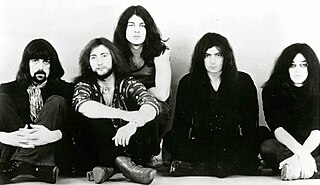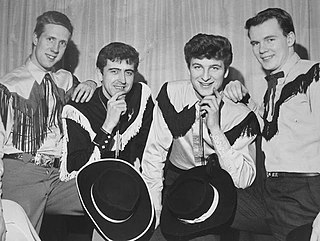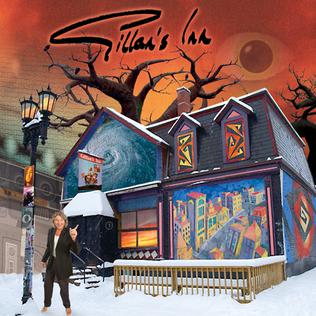Career
1963–1965
Meek's studio, RGM Sound, was based in North London, where he used a band called The Outlaws as his permanent studio musicians, also allowing them to record material under their own name. When Underwood arrived to audition for Meek, the Outlaws were also recruiting for a lead guitarist and it was Underwood who suggested Ritchie Blackmore should fill the role, an invitation he duly accepted.
Between January 1963 and June 1965, The Outlaws released six singles, as well as playing on hundreds of Meek's recording sessions with various artists. They also headlined at the Star-Club in Hamburg with both Jerry Lee Lewis and Gene Vincent. In 1964, they appeared in the movie Live It Up! , [3] performing their single "Law & Order", mislabelled "Law and Disorder" on the end screen credits.
A reviewer of Underwood's work at this time described his drumming style as "...coupling Charlie Watts type steadiness with little Jim McCarty style flourishes." [4] Blackmore eventually moved to another of Meeks' bands, joining Heinz Burt's backing band The Wild Boys, but he and Underwood still collaborated in recording sessions with Meek's engineer Derek Lawrence. One of the Derek Lawrence sessions produced Blackmore's first official release, the now highly sought-after single "Get Away" / "Little Brown Jug", released in July 1965. They also recorded "Earthshaker" and "Satan's Holiday, " which were released on the Titan label, credited to The Lancasters. "Satan's Holiday" was a fast, rock adaptation of Grieg's "In the Hall of the Mountain King", a tune that stayed in Blackmore's stage repertory right into the 1990s. Shortly afterwards, Underwood also left The Outlaws to take up an offer to join The Herd.
1965–1968
With The Herd, Underwood began playing at all the major venues on the circuit, such as the Marquee Club and Eel Pie Island. Despite their busy schedule and the release of three singles, Underwood grew increasingly frustrated at the band's lack of success, and in 1966 he resigned from the band and the music business. However, a year later he accepted an invitation from singer James Royal as a session drummer for a two-week residency at Hatchets in London's West End. At the end of the residency, Underwood decided to stay with the band, the James Royal Set to tour with Johnny Cash.
At the end of this tour, Underwood spoke with Peter Grant, whom he knew from the time that Grant had been tour manager for Gene Vincent when The Outlaws had been his backing band. Grant explained that he was currently working with guitarist Jimmy Page, and was recruiting musicians to form a new band around him. Underwood considered the offer, but instead accepted one to join established act Episode Six. Grant had asked one of his other acts, singer Terry Reid, to join the project, who had also turned down the offer. Undeterred, Grant went on to recruit two previously unknown musicians, the singer Robert Plant and drummer John Bonham, and the band became Led Zeppelin.
Underwood joined ex-The Authentics frontman Henry Turtle in psychedelic rock outfit The Doves from 1967 to 1968 alongside former The Herd guitarist Terry Clark plus Brian Curtis, Ian McGlynn, and Harvey Hinsley (formerly of The Outlaws and later a member of Hot Chocolate. Underwood departed in July 1968 after EMI declined to release intended single She's Not There, with Decca having done the same with the band's planned debut single, Smokeytime, Springtime, the previous Autumn.
1968–1970
Roger Glover, bass player for Episode Six, said of their new drummer: "Mick represented a step up for us because he had been around in other bands. The Herd had one fairly big hit so it was as if we had been connected with success." [2] Also in the band was singer Ian Gillan.
Despite numerous BBC sessions and two singles, commercial success never came for the band and there was a feeling that they were failing to move with the times as the music scene rapidly changed at the close of the 1960s. Along with Gillan, Underwood was drawn to the heavier sound of the emergent new bands, in particular Deep Purple (Ritchie Blackmore's new band) and Led Zeppelin. When Blackmore contacted Underwood for a recommendation for a singer, he immediately gave them Gillan's name. Along with Jon Lord, Blackmore attended an Episode Six gig to listen to Gillan, and shortly afterwards recruited both him and Roger Glover into Deep Purple. Following this shake-up, bassist/singer John Gustafson and keyboard player Pete Robinson were called in to shore up the band, but shortly afterwards the two newcomers left, along with Underwood, to form their own band Quatermass.
1970–1979
After several showcase gigs, Quatermass were signed by George Martin's Air London company and began to put together their first album, using their own material plus several songs written by Steve Hammond. Recorded at EMI's Abbey Road Studios the band's eponymous album was released on EMI's progressive rock label Harvest Records. One of the Hammond tracks on the album was titled "Black Sheep of the Family", later covered by Blackmore on the first Rainbow album. To promote the album the band undertook a European tour, with performances on radio and TV timed to coincide with the release of the album in various countries. Despite wide critical acclaim, the project had insufficient financial backing however, and there were many problems on their subsequent tour of the United States. On their return to the UK the band dissolved.
In the summer of 1971, Underwood began discussions with Paul Rodgers who was looking to form a new band after the initial break up of Free, and along with bass player Stuart McDonald they formed the band Peace. Signed to Island Records, Peace began to write and record material for a debut album and also embarked on a UK tour supporting Mott the Hoople but in January 1972 Free reformed, and Underwood formed another new band, called Sammy.
It was around this time that Underwood was offered the position of drummer with Hot Chocolate but he declined and successfully recommended Tony Connor – who had recently left Audience – for a position which was then held, temporarily, by session drummer Cozy Powell. [5]
Underwood called on Gillan to produce their first single, and the band then went into rehearsals for their debut album, which was then recorded in a single 72-hour session. As in previous projects, there was little commercial success and Underwood dissolved the band, returning to session drumming.
His next band was Strapps. Their eponymous debut album was recorded in 1976 at Ian Gillan's Kingsway Recorders studio in London, produced by former Episode Six colleague Roger Glover. They then toured as support act on Deep Purple's tour of the UK, and went on to release three further albums. [6]
Underwood worked again with Gillan as the support act on the UK tour of the Ian Gillan Band, whose line-up included former Quatermass colleague John Gustafson, on bass and backing vocals. Underwood sometimes took the opportunity to view the show from within the audience after playing his own set, and recalled that he "really picked up this bewildered vibe. The fans just couldn't connect with the music, however well it was played." [2]
Strapps fourth and final album Ball of Fire was recorded at Ian Gillan's Kingsway studios and during recording Underwood was asked by Gillan if he could use a couple of hours of their studio time to lay down a vocal with his latest band, Gillan. Several weeks later Gillan invited him to be the drummer in this new venture.
1979–1982
Former Deep Purple drummer Ian Paice had also auditioned for Gillan but according to guitarist Bernie Torme "...he had some difficulty after playing "Secret of the Dance" due to his only having one lung, and being a bit out of practice. He played it brilliantly but he had to lie down on the floor for five minutes afterwards. He did not want to join because of our fast tracks, he said he no longer wanted to play stuff like that. I think the fact that he had been offered to join Whitesnake with his old friend Jon Lord made a big difference. [7] Meeting Gillan again at the studio had obviously put Underwood's name on the list of potentials for the job, and as Torme revealed "...we finally found the magnificently solid and under-appreciated Mick Underwood. [8] The day after he accepted the job, Underwood and the band began to record the Mr. Universe album, released in October 1979.
Since 2006
Since 2006, Underwood along with bassist Johnny Heywood and former Heavy Metal Kids guitarist Cosmo, formed the blues-based trio Raw Glory, which released an album, City Life, in 2007. In 2012, he formed Mick Underwood's Glory Road with Rob Cooksley as singer, Jeff Summers on guitar, Gary Summers on bass and backing vocals, and Roy Shipston on keyboard, which consists of songs from the Gillan era.
In 2023 it was announced on Mick's "Glory Road" Facebook page that he had "mixed dementia" and would no longer be contributing to the page. The full text read as follows:
Message from Sue Underwood (Mick’s Wife)
For those that don’t know already, Mick is no longer using Facebook. Very sadly, he has been battling a mixed Dementia diagnosis for some time. He is unable to do many of the things he had previously enjoyed, one of which was chatting with you all and I know he certainly appreciated your support over the years.
On behalf of the family, we also appreciate the enthusiasm you have shown for Mick and his music, it is lovely to know how appreciated his talent is. Thank you.
All the best, Sue'' [9]
















